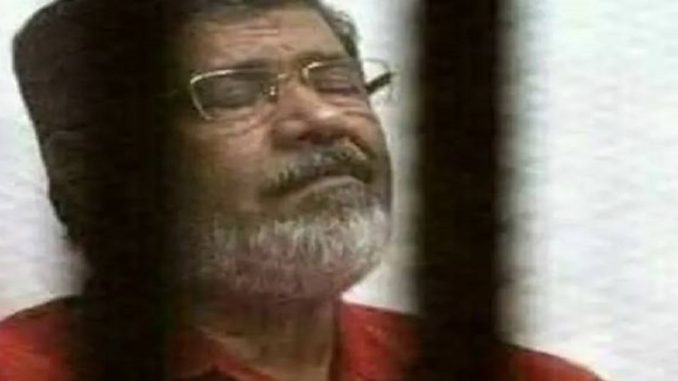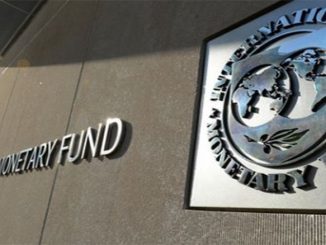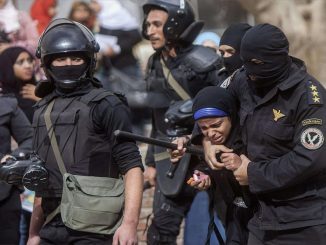
First, democratically-elected President Mohammed Morsi died while standing trial for charges legal observers said were politically motivated.
An independent panel of United Nations experts has said the death of former Egyptian president Mohammed Morsi in June could amount to “a state-sanctioned arbitrary killing”.
“Morsi was held in conditions that can only be described as brutal, particularly during his five-year detention in the Tora prison complex,” a statement from the office of the UN high commissioner for human rights said.
His death “after enduring those conditions could amount to a state-sanctioned arbitrary killing”, the statement added.
Morsi, Egypt’s first democratically elected president, died on June 17 while standing trial for charges that he and legal observers said were politically motivated.
He was deposed in a 2013 military coup carried out by Abdel-Fattah el-Sisi following a year in power.
Former Egyptian Ministers Amr Darrag and Yehia Hamed released a press statement on the UN investigation on the death of president #Morsi.
Former members of Egyptian government welcome United Nation’s investigation into the death of President Morsi and call for the investigation to also examine the suspicious circumstances of his son Abdullah Morsi’s death
ISTANBUL, 8th November 2019 – Today it was announced that UN Human Rights experts have called on Egypt to explain the circumstances surrounding the death of President Mohamed Morsi. President Morsi, who was Egypt’s first democratically elected President, had been detained by Egyptian authorities since being ousted in a bloody military coup in 2013.
In a press release, the UN Special Rapporteur Agnes Callamard and the Working Group on Arbitrary Detention stated that:
“Dr Morsi’s death after enduring those conditions could amount to a State-sanctioned arbitrary killing”
President Morsi died during court proceedings on 17th June 2019. His death followed widespread criticism of the manner in which he had been detained by Egyptian authorities.
A year before President Morsi’s death, members of his family had commissioned a UK based panel of Parliamentarians and senior lawyers to investigate his detention conditions. The panel was led by the former Chair of the UK’s Foreign Affairs Select Committee Crispin Blunt MP. The Panel published a report warning that if President Morsi’s extremely poor detention conditions continued, it would lead to his “premature death”.
Speaking after Morsi’s death, Crispin Blunt MP said:
“We found that his detention could meet the threshold for torture in accordance with Egyptian and international law. We found that the conditions of Dr Morsi’s detention would be of such continuing interest to the whole chain of command that the current president [the former army chief Abdel Fatah al-Sisi] could in principle be responsible for the crime of torture, which is a crime of universal jurisdiction.”
Shortly after President Morsi’s death his son, Abdullah Morsi, wrote privately to the United Nations to formally complain about the detention conditions which included a lack of medical care which the family believed led directly to the President’s death. Abdullah Morsi provided the United Nations with direct evidence of the manner in which the President had been treated and details of the President’s own suspicions that his “treatment” was designed to cause his death.
Shortly after Abdullah Morsi’s complaint was accepted by the United Nations, Abdullah died in what some consider to be mysterious circumstances. Abdullah was 25 years old when he died of a heart attack as alleged by the Egyptian Authorities. Before his death, Abdullah had been detained for one year by the Egyptian authorities for unproven charges, apparently because he had been an outspoken campaigner against the Egyptian authority’s treatment of this father.
Senior members of the Morsi government welcomed news of the United Nations’ investigation but called on the UN to extend their investigation to include the ‘suspicious circumstances’ surrounding the death Abdullah Morsi.
Former Minister of Investment Yehia Hamed said:
“I fully support the initiative taken by the United Nations human rights experts to investigate the death of President Morsi, but to fully understand the truth the United Nations must also investigate the death of Abdullah Morsi.”
“Abdullah died shortly after he privately gave crucial evidence about his father’s death to the United Nations. I was in close contact with Abdullah Morsi and I am convinced that it was his very brave work with the United Nations that led to his death. He knew that his safety was at risk when he sent his evidence to the United Nations and by repeatedly calling for better treatment for his father while his father was in detention.”
“I intend to formally ask the United Nations to extend their investigation to also look into the circumstances of Abdullah’s death”.
Former Minister of Planning and International Cooperation Amr Darrag said:
“We welcome and fully endorse the United Nations investigation into the conditions that led to the death of President Morsi.
“The international community has badly failed pro-democracy activists in Egypt and allowed autocratic regimes to violate international law without accountability. This investigation is a significant step forward in holding such regimes accountable for their actions.”
“Democratic movements in Egypt and the Middle East must know that they will be supported by the international community when autocratic regimes violate their rights and use criminal acts to try and suppress them”.



